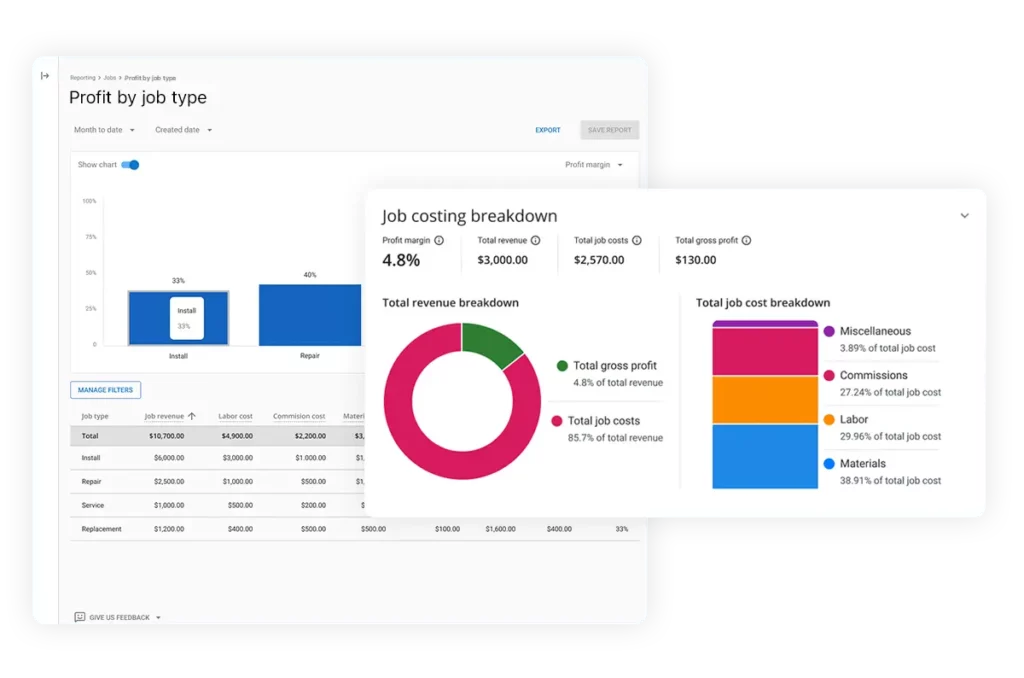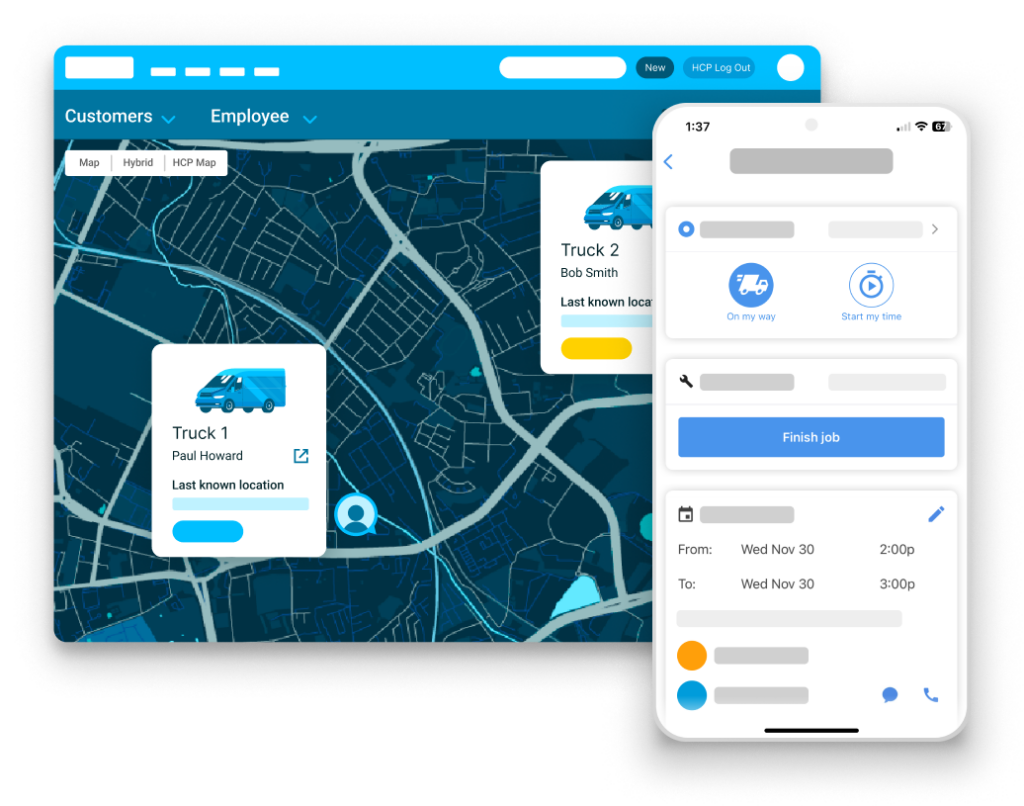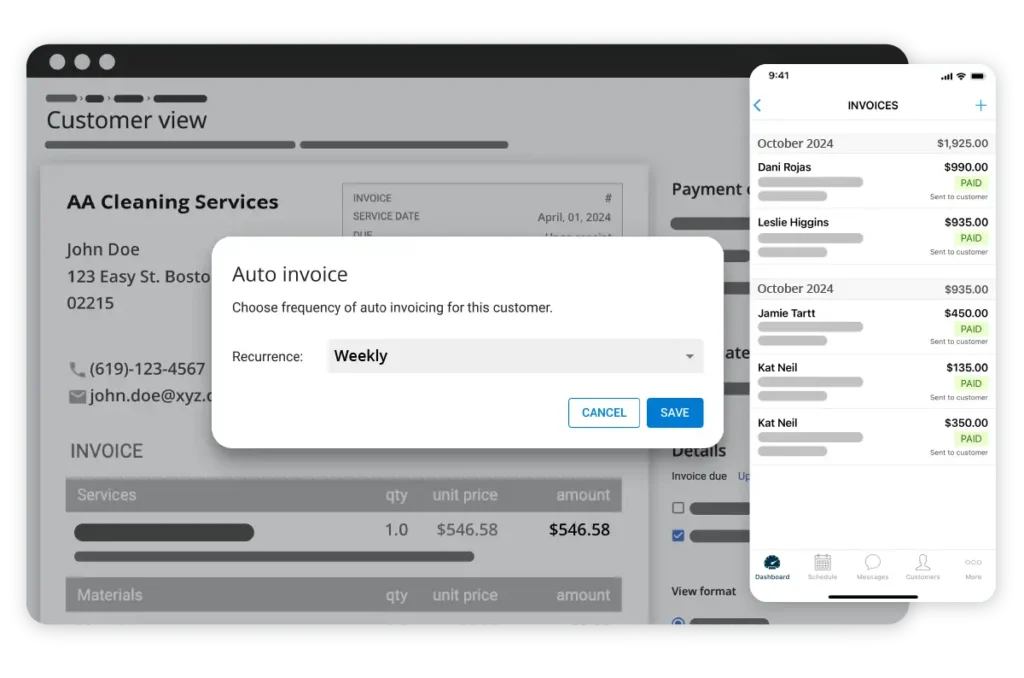
When you set yourself on the path to start a new business, you may find that you have stars in your eyes. You know—big plans and big dreams to create the best possible organization you can. And, like most people, you start thinking of all the great things you are going to do, the money you’ll rake in, and the lifestyle you will lead once you have found success.
And we won’t dampen your spirits. These are great dreams. But starting a business, especially a service business, takes a lot of work. Going in with a level head and reasonable expectations is the best way to set yourself on that path to future success. In this article, we’ll talk about how to know when it’s time to scale your business and how to keep operations flowing and profits high in the process.
Scale Your Service Business to Success With These 7 Steps
- 1. Focus on Profitability First
- 2. Invest in Technology to Streamline Growth
- 3. Build a Rockstar Service Team
- 4. Automate Repetitive Tasks
- 5. Focus on Marketing Strategies & Building an Online Presence
- 5. Scale Your Customer Experience
- 6. Document Internal Processes to Make Your Business Work Without You
- Service Scaling Done Right
Understanding When You’re Ready to Scale
It’s natural for business owners to want to know how to scale a professional service-based business. But it’s important to understand that these grandiose plans for the future are just that—for the future. It takes time to build a client base, get all of your operations in order, and get to the point where you can take on more business. And remember, when you get to that point, it’s not just about growth; it’s about growing in a way that you can sustain for the years to come.
So, how do you know when you’re ready to scale? Start by assessing your market demand, profit margins, and existing capacity. Ask yourself, “Can my current resources handle an increase in demand?” Review your operational workflows, staffing levels, and equipment to identify any limitations. A thorough analysis of these areas will help determine if now is the right time to expand or if you need to address gaps before proceeding.
Create a Clear Growth Plan
Once you’ve decided you’re ready to scale, outline a solid growth strategy. Begin by identifying specific goals for your business expansion. What milestones do you want to hit, and what key performance indicators (KPIs) will you use to track your progress?
Develop a roadmap that includes actionable steps to achieve these objectives, breaking them into manageable phases. Whether it’s entering new markets, hiring additional staff, or adopting new technology, a well-thought-out plan will help guide your efforts and keep your vision on track.
1. Focus on Profitability First

We can’t emphasize this point enough—profitability is where it’s at and this needs to be front and center in your growth plans. Do the numbers work in your favor? Review your current pricing and price book to confirm that your margins are strong enough to cover scaling expenses like hiring additional staff, adopting new tools, or expanding your marketing efforts. A thoughtful approach to pricing adjustments can make all the difference.
Increase Revenue Without Overworking
Scaling your service business doesn’t mean sacrificing your personal life. Maintaining a work-life balance is so important for your long-term success to prevent burnout and increase personal satisfaction.
Prioritize self-care, spend time with family, and remember that stepping away can recharge your creativity and decision-making. To grow revenue without overextending yourself, consider strategies like bundling services into packages that appeal to clients, offering premium options for those seeking added value, or focusing on higher-value clients who align with your business goals. These approaches can help you work smarter, not harder.
2. Invest in Technology to Streamline Growth

Many business owners today still use manual processes to manage their businesses. While it may work, what they might not realize is that these old-school methods could be preventing their company from growing at a faster rate.
Today, there is technology for just about everything we could ever need. And all of it is designed to help us manage our lives and businesses for the better. So, before you get too far in your growth plans, take a look at the technology that can get you where you need to go.
Build Infrastructure for Scalability
To learn how to scale a service business, having the right infrastructure is essential. Investing in technology like mobile apps, scheduling software, customer relationship management (CRM) systems, and service management tools can transform how you manage operations.
These tools can help you stay organized, keep track of customer interactions, and simplify your day-to-day processes, all while maintaining quality. For example, scheduling software can reduce miscommunications, while CRM systems make client follow-ups easy. By building this foundation, you’ll free up time to focus on growth strategies and meet the demands of a growing customer base without overburdening your team.
3. Build a Rockstar Service Team

If you are looking to grow your service business, regardless of your niche, it’s highly unlikely that you’ll be able to do it alone. To grow and scale, you need the best talent by your side, helping to take care of customers, managing the back office, etc. But how do you find the right employees?
Finding team members who align with your company’s values should be a primary focus. Look for individuals who not only bring the necessary skills to deliver outstanding service but also share your vision for creating a positive customer experience.
While some skills—such as technical expertise—are important for specific roles, others, like communication and problem-solving, can often be developed through training. Hiring the right people from the start helps reduce the high costs of employee turnover, which can range from one-half to two times the employee’s annual salary. That can lead to serious financial loss if it happens too frequently.
Free ebook: Learn how to foster scaleable mentality, train managers and hire the right leaders for your company to truly scale with our Guide to Hiring Leadership ebook.
Retain Employees with Growth Opportunities
Reducing turnover starts with offering employees opportunities to grow within your company. Invest in training programs to strengthen their skills and provide a clear roadmap for career advancement.
This could include additional certifications, leadership development courses, or even internal mentorship opportunities. Beyond training, consider offering extra incentives such as bonuses, commissions, or rewards for outstanding performance.
Creating a workplace where employees feel valued and have room to grow not only helps with retention but builds a positive culture that attracts high-quality talent.
4. Automate Repetitive Tasks

Speaking of hiring employees, technology allows you to automate some back-office tasks, which means you might not need to hire as many people as you think. By no means are we implying that robotic processes should take over and keep companies from hiring able-bodied individuals; it can help make your business more competent and help you maximize your profits.
Use automation to deliver consistent service at scale. From sending appointment reminders to processing payments, automation frees up your time to focus on growth and delivering a top-notch customer experience. Key areas to automate include:
- Appointment Scheduling: Simplify booking with tools that allow clients to schedule and reschedule without manual intervention. Customers today love the ability to avoid unnecessary phone calls that can be time-consuming. So, features such as online booking can make their lives easier, too.
- Customer Communication: Automate email and text reminders for upcoming appointments, follow-ups, and special offers.
- Invoicing and Payments: Set up systems to generate and send invoices automatically and process payments. This is a great way to help protect your business’s cash flow.
- Sales Pipeline Management: Use tools to track leads, follow up on potential clients, and nurture relationships over time.
- Accounting: Automate expense tracking, payroll, and tax preparation to keep finances organized and accurate. Your employees will appreciate being paid on time and your accountant will appreciate the extra efforts to keep your tax information in check.
- Voice Solutions: Invest in voice solutions so you can handle calls efficiently with call flows, queueing, and voicemail.
- Time Tracking: Track clock-in and clock-out times to monitor time spent on specific jobs and travel to improve labor efficiency.
5. Focus on Marketing Strategies & Building an Online Presence
Marketing and advertising is a must for any business that wants to grow. Of course, you have already established your base book of business, but your marketing efforts can help you get in front of more consumers who are in need of the services you offer.
Your website, social media platforms, and online reviews are often the first interactions potential customers have with your business. A professional and engaging website, active social media profiles on platforms such as Instagram, Facebook, TikTok, and LinkedIn (if you are focusing on commercial clients), and positive reviews can create trust and make it easier for people to choose your services over competitors.
And make sure your website is not a set-it-and-forget-it project. Regularly updating your website with great content and new information is a solid way to help more customers find you and help you rank higher in search engine results.
Experiment with Lead Generation Strategies
Experiment with a variety of lead generation methods. Digital strategies like SEO, social media, and paid ads can help you reach targeted audiences and identify what drives the most qualified leads.
Don’t overlook traditional methods, such as participating in community events, sending direct mail, or joining new movers’ programs, as they can still be highly effective. In fact, studies suggest that about 70% of homeowners look at their direct mail on the day it arrives in the mailbox, making it a great way to grow brand awareness.
Also, partnerships and referral programs can expand your reach by leveraging existing relationships with complementary businesses. By testing and refining your lead generation efforts, you’ll find a mix that works best for your business and sets you up for sustainable growth.
Get In Touch: 858-842-5746
Let us earn your trust
On average, Pros increase monthly revenue generated through Housecall Pro by 50% after their first year.
See plan options and feature breakdown on our pricing page.
5. Scale Your Customer Experience
As you invest in technology to make your business more efficient and get those marketing efforts off the ground, be sure that you continue to make a customer experience a priority. Consider that an estimated 52% of customers will give up on you and give a competitor their business after just one bad experience. Focus on delivering exceptional customer service at every touchpoint to keep customers happy and encourage loyalty. Satisfied current customers are not only more likely to return—they’re also more likely to recommend your business to others.
Tips to Prioritize the Customer Experience
- Simplify Booking: Use Housecall Pro’s online booking feature to let customers schedule services directly through your website or a custom booking link, offering convenience and transparency.
- Offer Service Plans: Provide customers with the option to sign up for recurring service plans to make ongoing maintenance simple and predictable.
- Simplify Communication: Send timely updates and reminders about appointments or changes to keep customers informed and reduce confusion.
- Gather Feedback: Regularly ask for customer input through surveys or reviews to identify areas for improvement and build stronger relationships.
- Personalize Interactions: Remember client preferences and use them to create a more tailored service experience that makes customers feel valued.
Free ebook: Learn how homeowners want to interact with your service business before, during, and after a job by grabbing a copy of our Ultimate Guide to Customer Experience for Home Services ebook.
How to Become the Go-To Service in Your Niche
One of the goals of scaling your business is inevitably to become the go-to service provider in your area for your niche. However, becoming your niche’s go-to provider requires expertise, consistency, and a strong presence in your community.
Start by positioning yourself as an industry leader through high-quality service and reliable results. Build credibility with educational content on your website and social media, such as blogs or videos, that address common questions in your field.
Stay engaged with your local community through partnerships, sponsorships, and events. Encourage happy customers to leave positive reviews, as word-of-mouth and social proof can significantly influence new clients. You’ll establish a reputation that sets your business apart from competitors by consistently delivering value and staying connected.
6. Document Internal Processes to Make Your Business Work Without You
You’ve likely heard people throw around phrases such as “if you were hit by a bus today, what would happen to x, y, or z?” And while we hope that no one is ever hit by a bus, the sentiment behind this phrase is this—is your business set up to operate successfully if you are not around? And of course, this goes beyond death. What if you want to take an extended holiday or sabbatical? What if you become ill? Will your team have the resources available to them to keep the company running?
Documenting all internal business processes should be non-negotiable. This includes detailed instructions for onboarding new employees, delivering services, managing day-to-day operations, and handling customer complaints. With clear documentation, your team can step up confidently when needed.
What to Document:
- Employee onboarding and training processes
- Standard service delivery workflows
- Customer communication protocols
- Steps for managing complaints and feedback
- Financial management practices, including invoicing and payroll
- Technology and software usage guides
Make Scaling Easier for the Future
With workflows and key processes documented, scaling your entire service business becomes so much more manageable. New team members will adapt faster, reducing the time it takes for them to become fully productive.
Established protocols also help maintain consistency in service quality as your business grows, fostering customer retention. By eliminating guesswork, you’ll keep operations running efficiently, even when expanding into new markets or taking on larger projects.
This foundation will support your long-term growth while freeing you to focus on strategic planning or personal time without worrying about interruptions to daily operations.
Service Scaling Done Right
Once you have identified that it is time to grow and scale your business, you want to make sure you do it right. Moving too fast or skipping over steps can be the best way to set your business on the path to failure.
The best approach is to prioritize profitability, invest in technology, automate repetitive tasks, and build a team that aligns with your vision. And, throughout all of these steps, make the customer experience a non-negotiable. Each of these steps contributes to creating a scalable foundation for long-term growth.
Ready to take the next step? With Housecall Pro’s field service software for growing small businesses, you can simplify your operations, reach more customers, and grow your business confidently. Start scaling smarter today with the tools that make it all possible.






